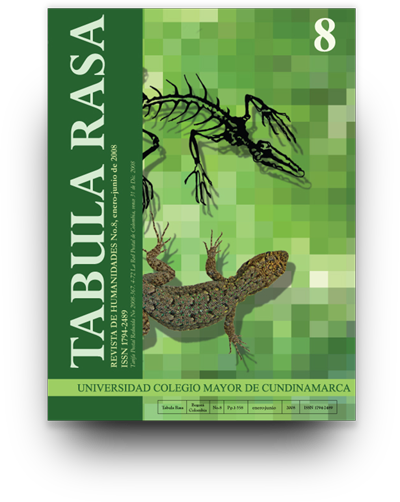The decolonial option: detachment and opening – a manifest and a case study
La opción de-colonial: desprendimiento y apertura. Un manifiesto y un caso
Show authors biography
The decolonial option in politics and in epistemology was the direct consequence of the imperial/colonial invasion, first in Anahuac and Tawantinsuyu, and since the middle of the XVIII century in different spaces of the Islamic world (i.e. the British colonization of Hindu-Muslim India, the French colonization of North Africa). Sub-Saharan Africa was also colonized in the XIX century, but it was plundered and suffered slave trade for America’s mines and plantations since the XVI century. African communities in America were not colonized like indigenous people; they were enslaved. Many indigenous people and Africans in America rejected to be governed by both the crown and the plantation owners. Dissidence emerged in different places and in different ways, some anti-imperial/colonial, some decolonial. Waman Puma de Ayala in the Andes, and Ottobah Cugoano, enslaved and taken to the Caribbean and later liberated in London, wrote their own political decolonial treaties that acknowledged Euro-centered theory and political thought (Aristotle, Plato, Saint Thomas Aquinas, Machiavelli, Hobbes, Locke, Rousseau, Montesquieu, etc.). They both illustrate the relevance of geopolitics of knowledge for future projects, based not on the experiences and desires of European history, but rather autonomous accounts; that is, no longer based on the world history written by Europeans, which responded to the sensibility and experience of this continent and not to the sensibility and experience of the rest of the planet.
Article visits 314 | PDF visits 181
Downloads
Agamben, Giorgio. 2002. L’aperto: L’uomo e l’animale. Turín: Bollati Boringhieri.
Amin, Samir. 1988. La desconexión. Hacia un sistema mundial policéntrico. Madrid: IEPALA editorial.
Anzaldúa, Gloria. 1987. Borderlands/La Frontera. San Francisco: Aunt Lute Books.
Bhagwati, Jagdish. 2005. En defensa de la globalización. El rostro humano de un mundo global. Barcelona: Debate.
Bogues, Anthony. 2005. Black Heretics, Black Prophets: Radical Political Intellectuals. Nueva York: Routledge.
Castro-Gómez, Santiago. 2005. La hybris del punto cero. Ciencia, raza e ilustración en la Nueva Granada (1750-1816). Bogotá: Instituto Pensar, Universidad Javeriana.
Césaire, Aimé. 1955. Discourse sur le colonialism. París y Dakar: Présence Africane [Trad. al castellano por M. Viveros Vigoya en Discurso sobre el colonialismo. Madrid: Ediciones Akal, 2006].
Cugoano, Ottobah. 1999 [1787]. Thoughts and Sentiments of the Evil and Wicked Traffic of the Slavery and Commerce of the Human Species, Humbly Submitted to the Inhabitants of Great Britain. Londres: Penguin.
Deloria, Vine, Jr. 2002. Evolution, Creationism and Other Modern Myths. Golden (Colorado): Fulcrum Pubishing.
García, Jorge; Lozano, Alfredo; Olivera, Julio, y Ruiz, César (eds.). 2004. Sumak Yachaypi, Alli Kawsaypipash Hachakuna (Aprender en la Sabiduría y el Buen Vivir). Quito: Universidad Intercultural Amawta Wasi – UNESCO.
Henry, Paget. 2003. Caliban’s Reason. Introducing Afro-Caribbean Philosophy. Londres: Routledge.
Mignolo,Walter D. 2005. The Idea of Latin America. Londres: Blackwell [trad. castellana en Editorial Gedisa, 2006].
Quijano, Aníbal. 1992 [1989]. «Colonialidad y modernidad/racionalidad», en H. Bonilla (comp.): Los conquistados. 1492 y la población indígena de las Américas. 437-448. Ecuador: Libri Mundi / Tercer Mundo Editores.
Ramos, Jorge Abelardo. 1973. El marxismo de Indias. Barcelona: Editorial Planeta.
Rousseau, Jean-Jacques. 1755. Discours sur l’origine et les fondements de l’inégalité parmi les hommes [Trad. al castellano por A. Pintor Ramos: Discurso sobre el origen y los fundamentos de la desigualdad entre los hombres y otros escritos. Madrid: Editorial Tecnos, 2002 (4ª ed. 2ª reimpr.)].
Sachs, Jeffrey D. 2005. The End of Poverty. Economic Possibilities for our Time. Nueva York: The Penguin Press.
Schmitt, Carl. 1922. Politische Theologie. Vier Kapitel zur Lehre von der Souveranitat. Munich/ Leipzig: Duncker und Humblot.
Wallerstein, Immanuel. 1995. After Liberalism. Nueva York: New Press




